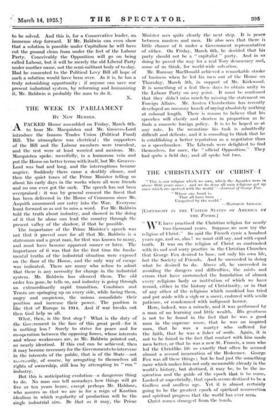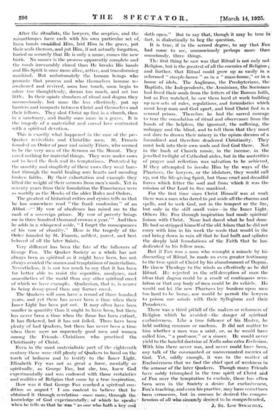THE CHRISTIANITY OF CHRIST—I " This is our religion which
we own, which the Apostles were in above 1600 years since ; and we do deny all vain religions got up since which ere spotted with the world."—Jouraut of Clem* For.
" Whose one bond is, That all have been Unspotted by the world."
—MATTHF.w ARNOLD.
[COPYRIGHT IN THE UNITED STATES OF AMERICA BY THE FOOL/Hi
" ANT E have practised the Christian religion for nearly two thousand years. Suppose .we now try the religion of Christ." So said the French cynic a hundred years ago, and so, alas ! we must still say, and with equal truth. It was on the religion of Christ as contrasted with its sad and sorr., practice in the Christian Churches that George Fox desired to base, not only his own life, but the Society of Friends. And he succeeded in doing what he: desired to do. Above all, he succeeded in avoiding the dangers and difficulties, the mists and errors that have surrounded the foundation of almost every religious body or institution of which we have record, 'either in the history of Christianity, or in that of any other of the religions which mankind has tried and put aside with a sigh or a sneer, endured with senile patience, or condemned with indignant horror. .
Here, indeed, was a miracle, and it was performed by a man of no learning and little wealth. His greatness is not to be found in. the fact that he was a good man in the supreme sense, that he was an inspired man, that he was a martyr who suffered for the _faith, that he was a fisher of souls.. Again, it is not to be foimd in the fact that contact with him made men better; or that he was a new St. Francis, a man who led the Christlike life so exactly that often he seemed almost a second incarnation of the Redeemer. GeOrge FOx was all these things ; but he had just the something mare which makes him not only memorable already in the world's history, but destined, it may be, to be the in- spiration and the guide of the epoch that is to come. Looked. at superficially, that epoch seems destined to be a Godless and soulless age. Yet it is almost certainly going to be the greatest epoch of spiritual resurrection and spiritual progress that the world has ever seen.
Christ comes strongest from the tomb. After the ritualists, the lawyers, the sceptics, and the misanthropes have each with his own particular set of.
linen bands swaddled Him, laid Him in the grave, put their seals thereon, and got Him, if not actually forgotten, buried so securely that He is only a name, comes the new birth. No sooner is the process apparently complete and the tomb irrevocably closed than He breaks His bands and His Spirit is once more alive, active, and transforming mankind. But unfortunately the human beings who promote that process and who themselves become re- awakened and revived, soon lose touch, soon begin to adore too thoughtlessly, dream too much, and act too little. In their opiate slumbers of ritual and dogma they unconsciously, but none the less effectively, put up barriers and ramparts between Christ and themselves and their fellows. They shut Christ up first in a church, then in a sanctuary, and finally once more in a grave. It is the tragedy of a materialist and carnal love contrasted with a spiritual devotion.
This is exactly what happened in the case of the pre- Quaker revivalists and Christlike men. St. Francis founded an Order of poor and saintly- Friars, who seemed to be the very men of the Sermon on the Mount. They cared nothing for material things. They were under vows not to heed the flesh and its temptations. Protected by the sanctity and simplicity of these vows they went bare- foot through the world healing sore hearts and mending broken faiths. By their exhortation and example they lifted the weight of their sorrows froth men's souls. Yet in seventy years from their foundation the Franciscans were as worldly as the Monks of the older Rules and Orders.
The greatest of historical critics and cynics tells us that he has somewhere read " the frank confession " of an Abbot—" My vow of obedience has raised me to the rank of a sovereign prince. My vow of poverty brings me in three hundred thousand crowns a year.' " And then he adds in a whispered aside, " I forget the consequences of his vow of chastity." Here is the tragedy of the Order founded by St. Francis, noblest, purest, and best beloved of all the later- Saints. - Very different has been the fate of the followers of George Fox. The Quaker Society as a whole has not • always been as spiritual as it might have been, has not always avoided the snares and temptations of materialism. Nevertheless, it is not too much to say that it has been far better able to resist the soporifics, anodynes, and anaesthetics of the world than any other spiritual creed of which we have example. Quakerism, that is, is nearer to being decay-proof than any former creed.
The Quakers will soon have a record of three hundred years, and yet there has never been a time when their Inner Light has been put out. It may often have been smaller in quantity than it ought to have been, but there has never beat a time when the flame has been extinct. It has flickered, but it has not failed. There have been plenty of bad Quakers, but there has never been a time when there were no supremely good men and women among the Friends---Christians who practised the Christianity of Christ.
Even in the most materialistic part of the eighteenth century there were still plenty of Quakers to hand on the torch of holiness and to testify, to the' Inner Light. Elizabeth Fry was not as great a force, mentally or spiritually, as George Fox; but she, too, knew God experimentally and was endowed with those certainties and realities of Religion that come by a true inspiration, How was it that George-Fox, reached a spiritual con- dition so august ?' am content to believe that he obtained it- through revelatiOn--,-oncel more; thrOngh the = knowledge of God- expel imentally,- -of- -which-he 'Speaks when he tells us that was " as one who bath a key and ' Both open." But to say that, though it may be true in: fact, is dialectically to beg the question.
It is true, if in the second degree, to say that Fox had tome to see, unconsciously perhaps more than. consciously, three things.
The first thing he saw was that Ritual is not only not Religion, but is the greatest of all the enemies of Religion ; and further, that Ritual could grow up as easily in a reformed " steeple-house " as in a " mass-house," or in a house of idols. The Anglicans, the Presbyterians, the Baptists, the Independents, the Arminians, the Socinians had freed their souls from the fetters of the Roman faith, but as Fox watched, he saw them hard at work building up new sets of rules, regulations, and formularies which must keep man and God apart, and bind Christ. fast in a sensual prison. Therefore he had the sacred courage to tear the consolation of ritual and observance from the hands of the helpless, the ignorant, the suffering, the unhappy and the blind, and to tell them that they must not dare to drown their misery in the opium dreams of a formalized and therefore deadened Christianity. . They must look into their own souls and find God there. Not, in the hush of ,Church music, in the incense, in the jewelled twilight of Cathedral aisles, but in the austerities of prayer and reflection was salvation to be achieved. If they attempted to invoke Him . by the ways of the Pharisees, the lawyers, or the idolators, they would call up, not the life-giving Spirit, but those cruel and dreadful forces which fetter the soul and from which it was the mission of Our Lord to free mankind.
For the first time since Christ Himself was at work there was a man who dared to put aside all the charms and spells, and to seek God, not in the tempest or the fire, but only in the . still small voice—in the . Inner Light. Others like Fox through inspiration had made spiritual liaison with Christ. None had dared what he had done. He had so stripped himself of the old Adam that he did nol carry with him in his work the seeds that would in the end brie g down in ruin all that he had built and splinter the deeply laid foundations of the Faith that he had dedicated to his fellow men.
But if Fox was a man who wrought a miracle by his discarding of. Ritual, he made an even greater testimony to the true spirit of Christ by his abandonment of Dogma. He threw Theology to the winds as effectively as he did Ritual. He rejected as .the self-deception of man the ideas that dogma could be a result of continuous reve- lation or that any body of men could be its vehicle.. He would not let the new Pharisees lay burdens upon men too hard to be borne, nor would he permit the lawyers to poison our • minds with their Syllogisms and their Paradoxes. • • There -was a third pitfall of the makers or reformers of Religion which he avoided—the danger of spiritual exclusiveness. Like a true follower of his Master, he held nothing common or unclean. It did not matter to him whether a man was a saint, or,. as he would have called him, " a professor," or a sinner. He would never yield to the hateful-doctrine of Nulla sales extra Eeclesiam. With him there never was, and never could have been, any talk of the covenanted or uneovenanted mercies of God. Yet, oddly enough, it was in the matter of Exclusiveness that we find' the chief spot -of weakness- in the armour of the later Quakers. Though many Friends have nobly triumphed in the true spirit of .Christ and of Fox over the temptation to exclude, there .has. often been seen in the Society a desire . for. exclusiveness, -Fox's teaching, and even his practice, may have sometimes been erroneous, but in. essence he desired. the rounpre- • hension of all-who sincerely desired to be. comprehended. Sr. Loa -STRAtTLEy;















































 Previous page
Previous page